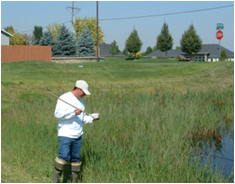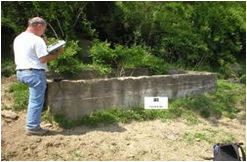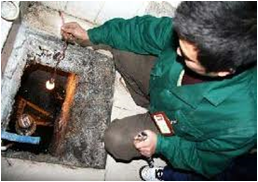Practitioner's Tool / Regulatory and Local Ordinances - Overview
Local governments can help drive the demand for wastewater treatment through policies in the form of local ordinances on wastewater management. Ordinances are effective when they support rather than inhibit the private sector in investing in wastewater systems. Ordinances are tools that can help establish an enabling environment to set standards for appropriate design and proper installation as well as to stimulate local initiative, interest and investment in wastewater treatment, reuse and recycling.
Contents
[hide]Driving Demand Through Economic Incentives
Economic incentives can be positive or negative. Positive incentives might provide tax breaks or reduced water bills for those that install proper wastewater systems. They could also provide official recognition for an establishment that is in compliance with wastewater management regulations to build upon pride of community, which is often an important desire that drives behavior change.
Effective local wastewater ordinances clearly define where proper wastewater treatment systems are required, how to go about obtaining permits to construct them and the consequences of non-compliance. The model texts below provide examples of language that could be used in wastewater ordinances.
Model Text – Where are Wastewater Systems Required
Owners of all new buildings and structures, whether public or private, residential, commercial, institutional, and/or industrial, must have proper wastewater management systems. Owners of existing buildings shall be required to provide compliant wastewater systems when buildings are sold, substantially remodeled, or in the case where an imminent public health hazard exists. (San Fernando City, 2010)
Effective policies recognize that in some instances, it is difficult, if not impossible, for owners of existing buildings to fully comply with this law due to space or other site constraints through language such as the below.
Model Text – Exceptions
If upgrading is not feasible and no imminent health threat exists, a condition of non-compliance shall be attached to the property deed, and provisional approval for continued use of the property may be granted. (San Fernando City, 2010)
Model Text – Rewards
Rewards, monetary or otherwise, shall be provided to individuals or group of individuals, neighborhoods and/or neighborhood leaders, private organizations and entities that have undertaken outstanding and innovative projects, technologies, processes, techniques or activities in connection with the Septage Management Program of the City. Funding for the rewards shall be sourced from the Trust Fund. (General Santos City Septage Ordinance)
Model Text – Penalties
For violation of any provision of this Ordinance, the City Engineer/City Health Officer shall issue a pre-numbered and accountable citation ticket to the person, owner, proprietor, manager, administrator of the establishment, institution, household stating therein the nature of the violation committed, the period within which the same must be settled, corrected or abated, and the consequence of continuing violation thereof. The violator shall suffer the following penalties:
- First Offense – Attendance in a seminar on the city septage management program.
- Second Offense – Fine in the amount stated hereunder plus attendance in a seminar on the septage management program:
- For public and private residential buildings
- For hotels, condominiums, town houses, apartments, lodging houses, banks, offices malls, restaurants and other business establishments
- For septic tanks used by hospitals, funeral parlors and similar operations - an appropriate fine or imprisonment of not less than one (1) day and not more than six (6) months, or both such fine and imprisonment at the discretion of the court, and attendance in seminar on septage management. (General Santos City Septage Ordinance)
Institutional Arrangements
Ordinances that detail institutional arrangements and procedures for achieving positive outcomes are an important component of scaling up wastewater projects. A transparent process driven by stakeholders and carried out through rigorous technical reviews and inspections are part of developing an environment that will enable wastewater systems to succeed. Regulatory review of the private sector's performance is important to ensure safety and sustainable outcomes. This may include site inspections to verify the findings of site investigation reports, technical reviews of submitted engineering plans and specifications, construction inspections to verify that wastewater system construction conforms to approved plans, and post-construction compliance inspections. Below are general requirements to consider.
Site Inspections
Regulators have an important role in verifying the information provided by the applicant about the proposed site for a wastewater system. The checklists, procedures and policies will help to ensure that site investigations are carried out fairly and consistently.
Site Inspection Checklist (.docx)
Plan Review
Plan reviews should be conducted by trained engineers with specific knowledge of wastewater management. Smaller cities may look to regional resources or the private sector to accomplish these tasks.
Permitting
Permits for wastewater systems may be issued prior to the issuance of building permits. Coordinating the permitting procedures between building, engineering and health departments will streamline the process. One-stop permitting offices have great appeal.
Construction Inspection
Inspection of the construction at defined points and milestones is required to ensure a quality product. Inspect facilities when sewer pipes are laid but not covered, when tanks are installed but not yet backfilled, and to verify leak tests and soils compaction. Some inspection tasks may be shared between building and health offices, or private sector contractors.
Construction Inspection Checklist (.docx)
Approval of Construction
Approval of the wastewater facilities should be a prerequisite of the issuance of the occupancy permit. This the opportunity for the regulatory authority to make sure that all aspects of the wastewater system construction complies with the local codes and policies.
Compliance Inspections
Periodic inspections of facilities after construction will help ensure the long-term sustainability of projects. Self-monitoring reports with periodic spot checks are tools that regulators may use to help ensure long term compliance.
Regulatory Roles and Responsibilities in the Philippines
Wastewater Management Council
A Wastewater Management Council is a regulatory body composed of parties responsible for wastewater management in the city. It includes the mayor; officials from each of the local government offices with an interest in wastewater (Engineering, Health, Environment, Finance, Planning and Development, Assessor, Legal, City Council); representatives of national government offices; and members at large, representing stakeholders, users, and consumers of wastewater services. Among the duties of the council is making information related to wastewater, such as lists of service providers, available to the public. The council provides an organized approach to regulation, with all of the local and national agencies working together to develop and refine procedures, issue permits, hear complaints, and solve wastewater problems. Achieving a fair and open forum provides confidence in the process and helps to reduce problems that can decrease demand the demand for improved systems. Below is an excerpt from an ordinance from General Santos City, Philippines establishing the Waste Management Board.
General Santos City Sustainable Waste Management Board (GSC-SWMB). – Without prejudice and in addition to the duties and functions of the officials named herein and mandated under the Local Government Code of 1991, the Charter of the City of General Santos and other national laws, the General Santos City Sustainable Waste Management Board, created by Ordinance No. 14, Series of 2005 shall, in addition to its functions, include septage management in its policy agenda and direction. Unless otherwise reconstituted by the City Mayor, and until a regular office or department shall have been created and filled up, the present Technical Working Group of the GSC SWMB shall provide technical and administrative support to the GSC-SWMB on matters pertaining to septage management. The City Mayor shall, through an executive order, reiterate the functions of the various departments and offices pertaining to the implementation of this Ordinance.






